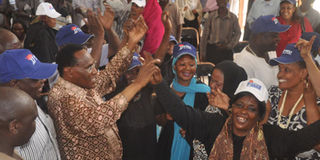Why political parties are in a frenzy to recruit members

file | NATION
PNU chairman Prof George Saitoti (left) dances to taarabu music with party members in Mombasa during a PNU leaders meeting recently. The party has stepped up efforts to recruit members.
What you need to know:
- Registrar says supporters must be registered voters and cannot belong to two organisations
at the same time
Political parties are racing against time to fulfil strict rules outlined in the Constitution or risk being disqualified from fielding candidates in the next General Election.
All registered political parties have until April 30 to comply with both the Constitution and the Political Parties Act or risk being deregistered.
The registrar of political parties Lucy Ndung’u told the Sunday Nation that the new laws demand of political parties to open headquarters with physical addresses and recruit not less than 1,000 members per county in at least half of the counties.
“Such party members must be registered voters and cannot belong to two parties at the same time because our system will reject that,” Mrs Ndung’u said.
The registrar added that after parties have filed their membership registers, officers will be sent out to the field to verify that the party members on the registers physically belong to the counties under which they are listed.
“It’s not a joke any more. If a name is entered as a member of PNU, the same cannot be entered under ODM,” she said. “It should never happen, and my records will be clear.”
Such registered party members, Mrs Ndung’u said, are the ones who will nominate the presidential candidate for their respective political party.
The requirements have sent political parties into a recruitment overdrive. The rush has been seen around the PNU Alliance parties, where each party has been on a recruitment drive as they seek a formula that will help them arrive at a single presidential candidate.
The PNU Alliance chief coordinator Kiraitu Murungi said that although their separate efforts currently appear untidy, they would arrive at a single entity with time.
“PNU Alliance was a creature of the leadership of both Kanu and PNU and since the leadership agreed that we have a common vehicle for fielding candidates, the actual coalition agreement has not been signed.
“They have only signed a protocol. Kanu has got to recruit, PNU has to recruit and Wiper (Democratic Movement Party) has to recruit for them to comply as we continue building the coalition through the alliance. But, for the common vehicle also to exist, it has to comply with the Act. That’s why it looks a bit messy,” he said.
ODM secretary-general Anyang’ Nyong’o urged his party delegates to traverse the country and recruit new members while urging them to ensure they acquire voters cards.
“Go everywhere and get new members for the party. You should organise rallies and champion the policies of the party and be conversant with the party’s constitution. Let’s maintain discipline within the party,” he told the delegates.
Prime Minister Raila Odinga, who is the ODM leader, cautioned the party officials against attempts to eject their opponents from the party and further discouraged those who lost in the party elections against leaving, saying the party needed all members to win the elections.
“We need to nurture internal democracy in the party by having free and fair elections, and those who lose should support the winners except in incidents where the party has called for repeat elections,” he said.
Justice minister Mutula Kilonzo faulted the PNU coalition saying that instead of recruiting members for the alliance, they should first concentrate on building individual political parties to ensure they are in compliance with the law.
“My wing of the coalition is a little confused on this matter. Most of our politicians have not understood the letter and spirit of the political parties law,” the minister told the Sunday Nation. “The priority should be on securing and building the existing political parties then they can join alliances if they agree to do so. It is only approved political parties which can join an alliance.”
Spirited scramble
Mr Kilonzo said Kenyans will, in the coming weeks, be caught up in a spirited scramble as the dozens of political parties fight to recruit them as members.
The major headache here for parties is the requirement that they must recruit a specified number of members from all regions. Politicians would particularly be keen to recruit their supporters into their parties as part of a campaign strategy to lock out opponents, especially during primaries.
Significantly, the Political Parties Act says only card-carrying members will participate in the nomination of candidates for election in party primaries. Besides, some parties may lack membership in certain regions due to the ethnic nature of Kenyan politics.
Mr Kilonzo said the Political Parties Act was aimed at dealing with party-hopping and encourage maturity in politics.
Safina leader Paul Muite said the new law ensures that political parties will be founded on ideology and built on genuine and dedicated membership.
This, he said, forces hard choices on voters – they must wake up to the reality that their political activities should be confined to individual political parties. “Democracy is underpinned by strong political parties,” he said.
Eyeing presidency
On Saturday, Planning assistant minister Peter Kenneth took his campaigns to his Central Kenya rival, Uhuru Kenyatta’s Gatundu stronghold. Mr Kenneth, who is eyeing the presidency on a Kenya National Congress ticket, held meetings in Gatundu appealing for support ahead of the General Election. The Gatanga MP said KNC would start its recruitment drive countrywide on February 1.
Narc-Kenya’s Martha Karua has taken a recruitment campaign to more than 30 counties across the country.




